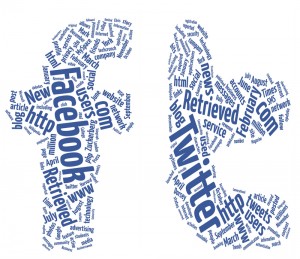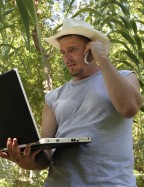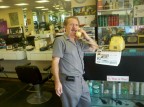 Unplug and Reconnect presents the winning essay in our Essay Contest. In his essay, journalist Patrick Ross of Alexandria, Va., describes a family vacation in the Shenandoah wilderness.
Unplug and Reconnect presents the winning essay in our Essay Contest. In his essay, journalist Patrick Ross of Alexandria, Va., describes a family vacation in the Shenandoah wilderness.
Edward Abbey spent a summer alone in Arches National Park, later chronicling his adventure in Desert Solitaire. A tattered copy of that book accompanied me off the grid this August. I wasn’t alone; I was with my wife and two teenage children. And I wasn’t in a desert; we were in the dense forest of Shenandoah National Park. But like Abbey, I learned the value of disconnection from technology, and the rewards of reconnection with people.
Cooking hot dogs over a fire, listening to the hoots of an unseen barred owl, trying to pick out constellations through the tree canopy of chestnut and red oak. Thank you, U.S. Park Service, for the lack of cell phone towers near our camp site, for not stringing fiber-optic cables to bring us a wi-fi network. It’s easier to unplug from the grid when there’s no temptation of an outlet.
We learned that one night when, weary of our own cooking, we trekked to a park lodge. My daughter quickly discovered a signal on her cell phone. As we stood in a majestic lobby with a picture-window view to the west, she faced east, responding to queries about her absence posted on her Facebook wall. My son responded likewise to a queue of texts. My wife tempted fate by checking her work email, quickly becoming ensnarled in a crisis she was powerless to address.
I resisted. Pulling up a rocking chair, I took in the show as the sun set over the Shenandoah Valley. To my left an older man stared at his Mac laptop screen, to my right a young woman’s face was aglow from her iPad. The sun was unconcerned, continuing to set despite being ignored. I basked in the warmth of superiority, dismissive of these humans Abbey referred to as tool-builders. They were oblivious of my condescension as well.
I had witnessed that dawn in a folding chair, a modest fire in front of me, Desert Solitaire in my left hand. I had bonded with Abbey, sharing his offense at the “petty tyranny” of technology. I lumped my smartphone in with his list of “automatic washers and automobiles and TV machines and telephones… what intolerable garbage and what utterly useless crap we bury ourselves in day by day.”
Upon returning home I was hesitant to reconnect. I feared drowning in a digital flash flood, a less fatal form of the real danger Abbey faced on a Glen Canyon rafting trip. As it happened, Hurricane Irene made the decision for me, knocking out our power. My phone’s battery was dead from a week’s worth of idleness, and I had no way of knowing how my Eastern Seaboard friends were faring.
Abbey celebrates his independence in Desert Solitaire, yet most of his narrative tells of his interaction with others — Park Service colleagues, a cowboy he guides steer with, his companion on that Glen Canyon rafting adventure. He admits that “Aloneness became loneliness and the sensation was strong enough to remind me (how could I have forgotten?) that the one thing better than solitude, the only thing better than solitude, is society.” It’s worth noting that he concludes the book’s Author’s Introduction with the following sign-off: “E.A., April 1967, Nelson’s Marine Bar, Hoboken.” He’s recalling fondly his time off the grid in a place nearly at the center of it.
Technology, despite what Abbey wrote, is not an oppressor. I can choose when to make use of my “utterly useless crap” and when to disengage, at least when the grid is still pulsing with electrons. And the society he longed for, that each of us longs for, is one we create. The grid permits connection to a larger society, and I welcome that. But that connection still doesn’t compare with a society of loved ones, face-to-face, lit not by the glow of a screen but by the flickers of a fire.
Photo: Shenandoah Sunset by Marisa Ross



